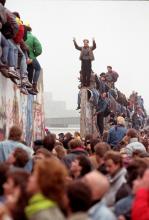Tuning In
Diasporic Contact Zones at the BBC World Service
Berlin '89

To mark the twentieth anniversary of the fall of the Berlin Wall, Tuning In organised a Witness Seminar to examine how the BBC World Service, with four decades of experience in mapping the course of the Cold War, set about the task of reporting this globally significant news story. Hosted at Bush House, the home of the BBC World Service, a panel of people closely involved in the BBC's reporting of this 'critical event' relived the experiences and challenges of that momentous period in front of an invited audience of broadcasters, policy-makers and academics. In its make-up, the witness panel reflected the managerial and journalistic dimensions of BBC World Service activities as well as the political and diplomatic contexts within which it broadcast. An analysis of this witness seminar and the issues it raised, in conjunction with wider use of oral testimony and archival research forms the basis of a forthcoming journal article by Dodsworth and Webb entitled Bush House and the Fall of the Berlin Wall: Generational and Organisational Change at the BBC World Service.
Research aims
- To examine the internal topography of the BBC World Service as revealed by this critical event
- To explore, as part of a discourse between journalists, engineers, diplomats and policy-makers, the functions of Bush House as a media centre.
Research questions
- At a moment of intense international crisis, how did the BBC World Service orchestrate its reporting both in terms of internal modes of media production and in relation to its wider network of correspondents and news sources?
- What was the nature and extent of the interaction between domestic and overseas services in reporting a story which had such wide appeal amongst British and global audiences?
- The fall of the Berlin wall and the subsequent dissolution of the Soviet Union removed major obstacles to reporting developments in Central and Eastern Europe with significant consequences for recruitment and access to sources. Did these factors change media practices within Bush House and what were their long-term consequences?
Project contact:
Dr Alban Webb, The Open University, a.j.webb@open.ac.uk
Dr Alban Webb is a Research Fellow in Sociology at the Open University, working as part of the ESRC Centre for Research on Socio-Cultural Change (CRESC). His previous research as a historian has focused on Cold War Britain, examining the UK's nuclear deterrence strategy, intelligence services and civil defence planning. His book on the BBC World Service, London Calling: BBC External Services and the Cold War, will be published in 2011. His latest research, on the roles of public and cultural diplomacy in the context of international relations (most recently as part of the AHRC-funded Tuning In: Diasporic Contact Zones at the BBC World Service project) forms the basis of his ongoing examination of the changing Cultures of Diplomacy at work in British overseas communication strategies.
Francis Dodsworth is a Research Fellow at the Open University, based in the ESRC Centre for Socio-Cultural Change (CRESC). His research explores the social and cultural history of modern Britain, from the eighteenth to the twentieth century. One element of this has involved the study of organisations, with work on the history of policing in the eighteenth and nineteenth centuries, and on the BBC in the twentieth century. A second element has been a focus on the built environment, with studies of commercial, religious and governmental buildings from the early eighteenth to the early twentieth century. One part of his current research involves an analysis of the impact of migration on the built environment of the city, with a focus on religion; a second research project explores the relationship between politics and culture in the shaping of the modern city through the English 'improvement commissions' of the late eighteenth and early nineteenth centuries.
Project members:
- Witness Seminars


